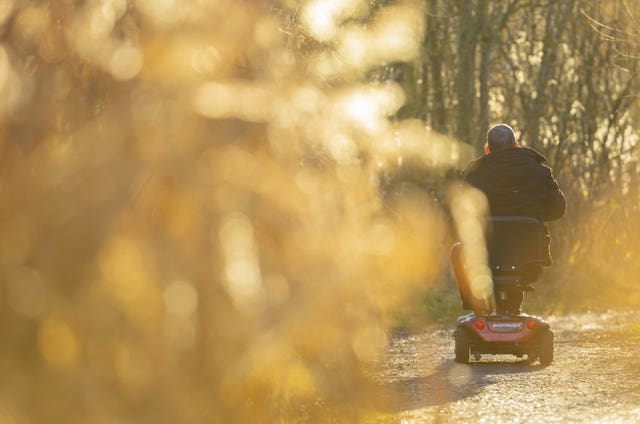
Patients suffering from various health issues could be advised to connect with nature to improve their wellbeing in a first for England.
Nature prescriptions could be given to patients in High Peak, Derbyshire, after a successful pilot in Scotland.
They are being run by the Royal Society for the Protection of Birds (RSPB), in collaboration with the Peak District National Park Authority, amid increasing evidence that people who are connected with nature have improved mental wellbeing, are happier and are more satisfied with life.
Users are given a calendar of ideas to inspire them to connect with nature, including searching for frost on leaves and listening to sounds outdoors, and can complete the programme on their own or with others.
Sarah Walker, nature and wellbeing project manager at RSPB England, said: “I’m thrilled to see the project coming to life in the High Peak and can’t wait to see how people in the area benefit from nature prescriptions.
“Working together with the Peak District National Park we have used our experience of connecting people to nature combined with the local knowledge of social prescribing services to develop something which is locally relevant and accessible for people to do from their own homes or close by. At the end of the day we’re all part of the natural world, and helping people to connect with it is so important.”
She added: “We’d love to see nature as a part of every health professional’s toolkit in the future. So many people are faced with a whole range of pressures in their lives and nature could provide a way to help them through.”
Patients will be referred by community mental health teams, adult social care teams, other local support agencies and 13 GP surgeries in the area, to two social prescribing services.
The prescribing services take a holistic approach to health and wellbeing and can signpost patients to a variety of support networks based on the individual, including help with financial management and personal training, with nature prescriptions aimed at reducing stress, fatigue, anxiety and depression.
It comes after a trial run by RSPB Scotland in the Shetland Islands and Edinburgh saw 74% of patients say they benefited from the prescription, and 87% say they would continue to use nature to support their health and wellbeing.
As well as the trial in High Peak – which is running indefinitely – it is also being rolled out in more locations in Scotland.
Tom Miller, a GP in Buxton, Derbyshire, who is taking part in the trial, said: “Making sure we’re taking care of our health and wellbeing is incredibly important, particularly in January when life can be a real struggle; the days are short and money can be tight.
“Nature prescriptions are a great way for people to potentially boost their wellbeing by taking time to be with nature.

“Evidence is emerging that time outdoors is good for our health and this is an ingenious, simple and cost-effective way to support people to do just that.”
High Peak partially covers the Peak District National Park, the country’s first national park, which opened in 1951 and boats 555 square miles of land. Around 20 million people live within one hour’s travelling time.
Jo Hanney, communities and wellbeing ranger at the Peak District National Park, said: “We have decades of experience of enabling people to connect with nature in the Peak District National Park, but the RSPB nature prescription is a new way of working for us.
“This experience and our knowledge of the Peak District have been key to developing the new tool, which is the first of its kind in England.
“We will be able to reach a far wider and more diverse audience by connecting people to the national park through the prescription.
“This exciting partnership sees the real benefits of spaces like our national parks more widely recognised as places that can make a very real and positive difference to people’s lives.”


Why are you making commenting on The Herald only available to subscribers?
It should have been a safe space for informed debate, somewhere for readers to discuss issues around the biggest stories of the day, but all too often the below the line comments on most websites have become bogged down by off-topic discussions and abuse.
heraldscotland.com is tackling this problem by allowing only subscribers to comment.
We are doing this to improve the experience for our loyal readers and we believe it will reduce the ability of trolls and troublemakers, who occasionally find their way onto our site, to abuse our journalists and readers. We also hope it will help the comments section fulfil its promise as a part of Scotland's conversation with itself.
We are lucky at The Herald. We are read by an informed, educated readership who can add their knowledge and insights to our stories.
That is invaluable.
We are making the subscriber-only change to support our valued readers, who tell us they don't want the site cluttered up with irrelevant comments, untruths and abuse.
In the past, the journalist’s job was to collect and distribute information to the audience. Technology means that readers can shape a discussion. We look forward to hearing from you on heraldscotland.com
Comments & Moderation
Readers’ comments: You are personally liable for the content of any comments you upload to this website, so please act responsibly. We do not pre-moderate or monitor readers’ comments appearing on our websites, but we do post-moderate in response to complaints we receive or otherwise when a potential problem comes to our attention. You can make a complaint by using the ‘report this post’ link . We may then apply our discretion under the user terms to amend or delete comments.
Post moderation is undertaken full-time 9am-6pm on weekdays, and on a part-time basis outwith those hours.
Read the rules here